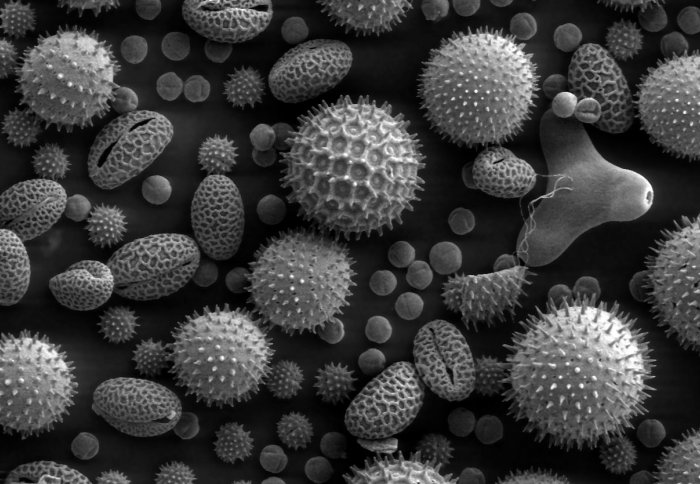Early trials show potential for treating hay fever with grass protein fragments
by Ryan O'Hare

Immunotherapies for hay fever are based on proteins taken from pollen grains (illustrated)
Protein fragments taken from grass can help protect hay fever patients from allergic reactions to pollen grains.
The findings come from a study to be published in the Journal of Allergy and Clinical Immunology, which shows that the approach could potentially overcome complications associated with current immune-based therapies for hay fever.
In a first-in-human trial, a team led by researchers at Imperial College London found that the treatment was safe and well-tolerated by patients, and could be developed into a treatment for patients who do not respond to over-the-counter medications, or who react poorly to current clinic-based treatments.
Hay fever, or seasonal allergic rhinitis, affects as many as one in four people in the UK, leaving sufferers with bouts of sneezing, a runny nose and itchy eyes, and can affect work, school and leisure during the summer months when the pollen count soars.
Recognising foreign proteins
The reaction comes about when the body recognises pollen – typically from grass or trees – as a microbial invader, and launches an immune response. While the majority of sufferers can keep symptoms at bay with over the counter medicines, such as antihistamines, some may require more intensive immune-based therapy in a clinical setting.
Current immunotherapies offered to patients are based on exposing the immune system to grass pollen, the most common trigger for sufferers, over time. These extracts are delivered either through injections or a pill, enabling the patient to build up a resistance.
There is a clear medical need to develop new, more efficient and safer treatments for all allergic patients
– Dr Mohamed Shamji
Lead author
For some patients, however, this approach is not suitable, with the immunotherapy treatment triggering systemic side effects, such as headache, diarrhoea, and even some patient’s going into anaphylactic shock.
One avenue being explored to overcome these complications is focused on using shorter fragments (called peptides), rather than the whole protein. While these fragments are recognised by the cells of the immune system, they do not bind to IgE antibodies.
As part of the typical allergic response, Y-shaped IgE proteins stick to the surface of the foreign pollen proteins, before attaching to a white blood cell. Once activated, the cell releases floods of chemical signals, such as heparin and histamine, which act as a call to arms for other immune cells and results in a systemic immune response.
In a small randomised controlled trial, researchers tested the effects of the peptides from ryegrass (Lolium perenne) developed into an immunotherapy (LPP) in 12 patients with hay fever and 12 patients without.
Lasting effects
Over the course of 25 weeks, patients received increasing doses of the treatment, with blood tests showing a gradual increase in levels of the peptide.
Analysis showed that the treatment resulted in antibodies which lasted for almost six months after the treatment finished. Crucially, the peptide treatment resulted in fewer side effects when compared to patients receiving the whole protein.
According to the researchers, further clinical trials are needed to prove the effectiveness of the therapy in larger groups of patients with hay fever, before it could be made available in clinics.
Further trials are underway and the researchers expect to publish the findings later this year.
Dr Mohamed Shamji, from Imperial’s National Heart and Lung Institute, said: “There is a clear medical need to develop new, more efficient and safer treatments for all allergic patients.
“Although risk factors have been identified and are being considered when using immunotherapy, we cannot predict if an individual patient will develop a severe or serious systemic reaction or not, before they begin the treatment.”
He added: “Showing that grass peptide injections are safe and well-tolerated by patients is a great initial step in the development of a suitable treatment.”
The research was funded by ASIT biotech, the Brussels-based firm developing the treatment.
-
‘Lolium perenne peptides for the treatment if grass pollen allergy: A randomized double blind placebo-controlled trial’ will be published in the Journal of Allergy and Clinical Immunology.
Image: Pollen from a variety of common plants including sunflower and lily (CC) Source: Dartmouth College Electron Microscope Facility
Article text (excluding photos or graphics) © Imperial College London.
Photos and graphics subject to third party copyright used with permission or © Imperial College London.
Reporter
Ryan O'Hare
Communications Division